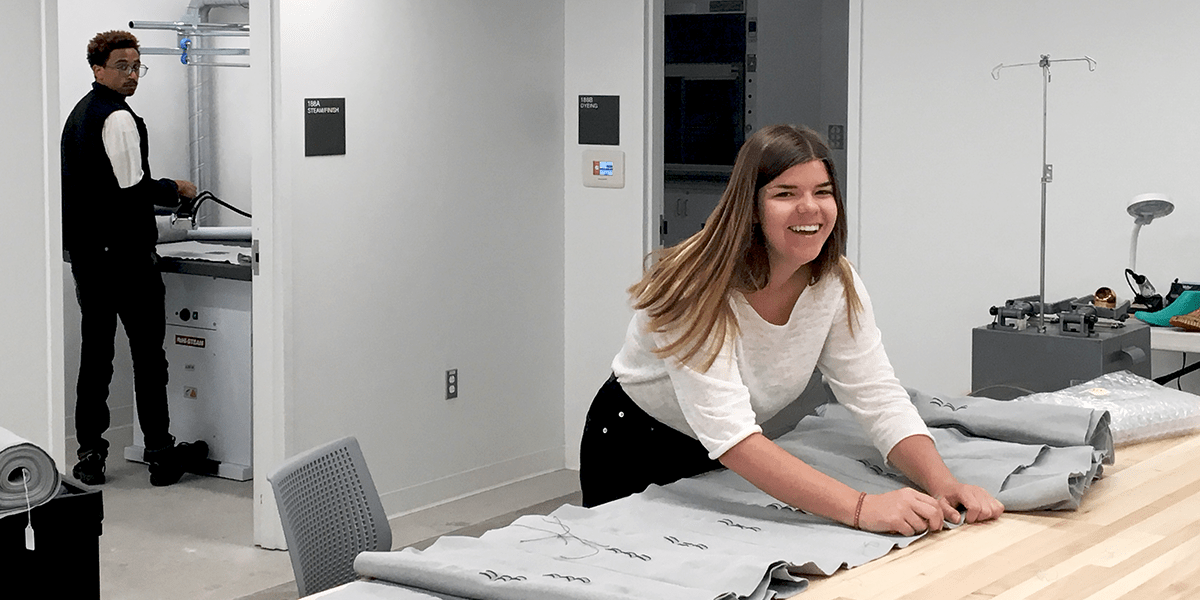Carly Kandler '19 and Keith Taylor '19

Drexel’s Center for Functional Fabrics is the very definition of innovation. Internationally recognized for its pioneering research in “smart textiles,” the center designs and integrates new technology into fabrics, such as fibers that conduct energy and a wireless battery-less fabric bellyband that can monitor contractions in pregnant women.
Drexel students contribute regularly to the transdisciplinary work of the center, which employs undergraduate co-ops from a variety of disciplines. For Carly Kandler (CK), design and merchandising ’19, and Keith Taylor (KT), mechanical engineering ’19, their Drexel-funded co-ops at the center provided opportunities to innovate, be inspired and gain hands-on experience at the cutting-edge.
Whatever my next step is, I know the sky’s the limit, because I will have learned so much and have so many skills to leverage.
Carly, your academic background is merchandising and Keith, you come from engineering. How did you both end up in co-ops at the Center for Functional Fabrics?

CK: I’m not just interested in fashion but in sustainability and innovation within the textile industry. One of my favorite classes I took at Drexel was a textiles course, which spurred my interest in how textiles are produced because of the environmental effects of dyeing fabric and of waste in producing garments. I was drawn to the center because its work in textile production is so exciting and different from traditional fashion industry.
KT: I started out in mechanical engineering because I was interested in cars, and I got into the center through the STAR Scholars program (Students Tackling Advanced Research) where you spend the summer after freshman year working in a Drexel lab. As a STAR research assistant, I saw mechanical engineers working with material scientists and designers. After that, I became more interested in the center’s work and decided to minor in product design.
CK: The director, Professor Genevieve Dion, wants people of different backgrounds involved because projects benefit from different styles of training. The Center is truly transdisciplinary that way. I worked alongside people working to source materials, develop new materials, and electrical and mechanical engineers working on the functional aspects.
What did you do during your co-ops at the Center?
CK: My co-op was in customer relationship management, designing workflows and preparing for the implementation a CRM software. I learned about the business and research aspects of textiles, from legal agreements to prototyping to production. And because I was always peeking into the lab, I got to learn about the machines that do the work. After my co-op, I transitioned to a work-study employee working in the lab.
KT: After the STAR program, my co-op was also as a research assistant. This time, I trained on how to operate the equipment and make samples on the industrial knitting machines. I supported other students who were testing new materials for their manufacturability – if a textile can be scaled up for production or produced at all.

What aspects of the Center made the biggest impression on you?
CK: The whole culture of the center pushes people to go beyond the technology that’s available. For example, when we were tasked to knit wire into a textile, we had to retrofit our existing technology to do the job. There is a constant sense of change and progress, it keeps everyday exciting.
KT: There’s this whole idea, again, of being transdisciplinary. There’s always collaboration in building machines and parts, or modifying them, to do what they aren't made to do. If we need to pull in other areas of expertise to solve a problem, we do that. It’s also exciting to work around innovation. I like the world of wearable technology. The way smart textiles are advancing, we're going to be able to understand our bodies better, by wearing fabrics that can monitor our vitals.
How do you think your co-op at the Center prepared you for the future?
CK: After my co-op, I did a work study at the Center in research and development. I gained an understanding of many different sides of the traditional and functional fabrics industries, so I have the flexibility to pursue a variety of careers. My dream job is with a company that practices ethical manufacturing, sustainable sourcing, and production.
KT: I now have a full-time job at the Center as a textile fabrication technician. I have a pretty versatile role – helping design or modify parts, programming the knitting machines to produce samples, or working with modeling software to create a visualization of a sample. I’m happy at my job right now, but whatever my next step is, I know the sky’s the limit, because I will have learned so much and have so many skills to leverage.
Support the Future Fabrics Strategic FundContact Us
215.895.2612
giving@drexel.edu
Mail your gift to
Drexel University
P.O. Box 8215
Philadelphia, PA 19101-9684
Drexel University Tax ID (EIN): 23‐1352630